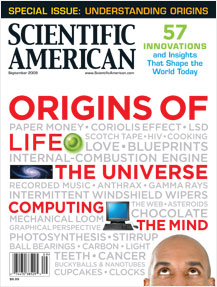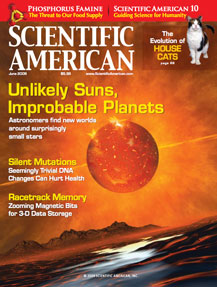How a lack of control leads to superstition
and what can be done about it
Imagine a time in your life when you felt out of control—anything from getting lost to losing a job. Now look at the Figure 1 on this page. What do you see? Such a scenario was presented to subjects in a 2008 experiment by Jennifer Whitson of the University of Texas at Austin and her colleague Adam Galinsky of Northwestern University . Their study, entitled “Lacking Control Increases Illusory Pattern Perception,” was published in Science.
Defining “illusory pattern perception” (what I call “patternicity”) as “the identification of a coherent and meaningful interrelationship among a set of random or unrelated stimuli … (such as the tendency to perceive false correlations, see imaginary figures, form superstitious rituals, and embrace conspiracy beliefs, among others),” the researchers’ thesis was that “when individuals are unable to gain a sense of control objectively, they will try to gain it perceptually.” As Whitson explained the psychology to me, “Feelings of control are essential for our well-being—we think clearer and make better decisions when we feel we are in control. Lacking control is highly aversive, so we instinctively seek out patterns to regain control—even if those patterns are illusory.” (continue reading…)
read or write comments (8)
Michael Shermer says the human tendency to believe strange things — from alien abductions to dowsing rods — boils down to two of the brain’s most basic, hard-wired survival skills. He explains what they are, and how they get us into trouble.
Comments Off on The Pattern Behind Self-Deception (TED 2010)
Why people believe in conspiracies
After a public lecture in 2005, I was buttonholed by a documentary filmmaker with Michael Moore-ish ambitions of exposing the conspiracy behind 9/11. “You mean the conspiracy by Osama bin Laden and al Qaeda to attack the United States?” I asked rhetorically, knowing what was to come.
“That’s what they want you to believe,” he said. “Who is they?” I queried. “The government,” he whispered, as if “they” might be listening at that very moment. “But didn’t Osama and some members of al Qaeda not only say they did it,” I reminded him, “they gloated about what a glorious triumph it was?”
“Oh, you’re talking about that video of Osama,” he rejoined knowingly. “That was faked by the CIA and leaked to the American press to mislead us. There has been a disinformation campaign going on ever since 9/11.” (continue reading…)
read or write comments (130)
Did humans evolve to be religious and believe in God? In the most general sense, yes we did. Here’s what happened.
Long long ago, in an environment far far away from the modern world, humans evolved to find meaningful causal patterns in nature to make sense of the world, and infuse many of those patterns with intentional agency, some of which became animistic spirits and powerful gods. And as a social primate species we also evolved social organizations designed to promote group cohesiveness and enforce moral rules.
People believe in God because we are pattern-seeking primates. We connect A to B to C, and often A really is connected to B, and B really is connected to C. This is called association learning. But we do not have a false-pattern-detection device in our brains to help us discriminate between true and false patterns, and so we make errors in our thinking: a Type I error is believing a pattern is real when it is not (a false positive) and a Type II error is not believing a pattern is real when it is (a false negative). Imagine that you are a hominid on the planes of Africa and you hear a rustle in the grass. Is it a dangerous predator or just the wind? If you assume it is a dangerous predator and it is just the wind, you have made a Type I error, but to no harm. But if you believe the rustle in the grass is just the wind when it is a dangerous predator, there’s a good chance you’ll be lunch and thereby removed from your species’ gene pool. Thus, there would have been a natural selection for those hominids who tended to believe that all patterns are real and potentially dangerous. I call this process patternicity (the tendency to find meaningful patterns in random noise) and agenticity (the tendency to believe that the world is controlled by invisible intentional agents who may mean us harm). This, I believe, is the basis for the belief in souls, spirits, ghosts, gods, demons, angels, aliens, intelligent designers, government conspiracists, and all manner of invisible agents intending to harm us or help us.
People are religious because we are social and we need to get along. The moral sentiments in humans and moral principles in human groups evolved primarily through the force of natural selection operating on individuals and secondarily through the force of group selection operating on populations. The moral sense (the psychological feeling of doing “good” in the form of positive emotions such as righteousness and pride) evolved out of behaviors that were selected for because they were good either for the individual or for the group; an immoral sense (the psychological feeling of doing “bad” in the form of negative emotions such as guilt and shame) evolved out of behaviors that were selected for because they were bad either for the individual or for the group. While cultures may differ on what behaviors are defined as good or bad, the moral sense of feeling good or feeling bad about behavior X (whatever X may be) is an evolved human universal. The codification of moral principles out of the psychology of the moral sentiments evolved as a form of social control to insure the survival of individuals within groups and the survival of human groups themselves. Religion was the first social institution to canonize moral principles, and God as an explanatory pattern for the world took on new powers as the ultimate enforcer of the rules.
Thus it is that people are religious and believe in God.
• FOLLOW MICHAEL SHERMER ON TWITTER •
Comments Off on Homo religious
Why people believe that invisible agents
control the world
Souls, spirits, ghosts, gods, demons, angels, aliens, intelligent designers, government conspirators, and all manner of invisible agents with power and intention are believed to haunt our world and control our lives. Why?
The answer has two parts, starting with the concept of “patternicity,” which I defined in my December 2008 column as the human tendency to find meaningful patterns in meaningless noise. Consider the face on Mars, the Virgin Mary on a grilled-cheese sandwich, satanic messages in rock music. Of course, some patterns are real. Finding predictive patterns in changing weather, fruiting trees, migrating prey animals and hungry predators was central to the survival of Paleolithic hominids. (continue reading…)
read or write comments (11)




